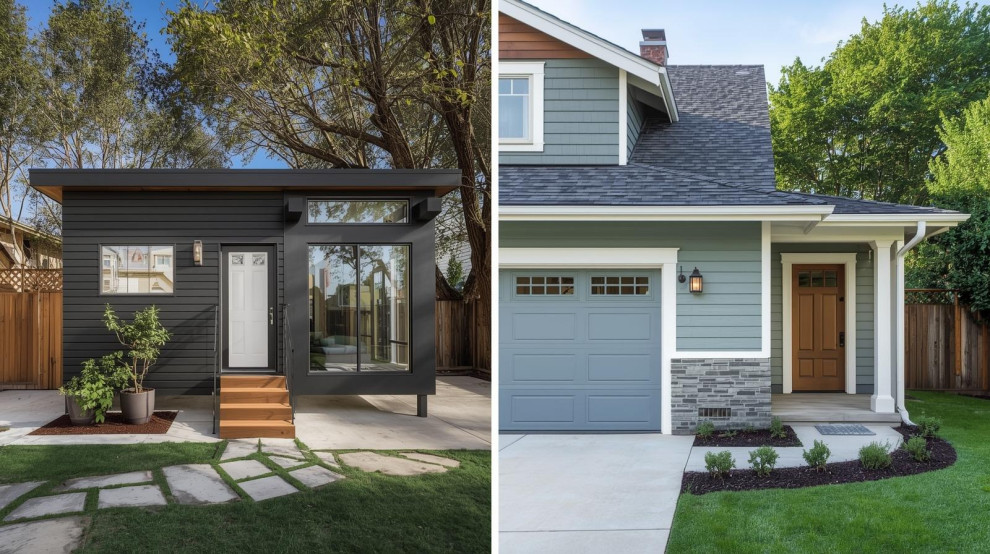Detached vs. Attached ADUs: Which One Is Right for You?

As housing costs continue to rise across California, Additional Dwelling Units (ADUs) have become one of the most practical ways for homeowners to add value, create flexible living space, and potentially generate rental income. Whether you’re thinking about housing aging parents, creating a private office, or adding a rental unit, ADUs offer a smart solution that works within your existing property.
However, one of the first—and most important—decisions you’ll make in your ADU journey is choosing between a Detached ADU and an Attached ADU. Each type comes with its own benefits, considerations, and design implications. Understanding the differences will help you determine which option fits your lifestyle, budget, and long-term plans.
At Coleman Build, we work closely with homeowners across Southern California to design and construct ADUs that are not only functional but also enhance the beauty and value of your home. Here’s what to consider when deciding between a detached and attached ADU.
What Is an Attached ADU?
An attached ADU is built as an extension or addition to your existing home. It shares at least one wall with the primary residence and often utilizes the home’s existing infrastructure. Examples include converting an attached garage, extending the side of your home, or building a new second-floor suite.
Key Advantages of Attached ADUs:
- Cost Efficiency: Because attached ADUs can tie into your home’s existing plumbing, electrical, and HVAC systems, they may require fewer construction resources compared to standalone structures.
- Space Efficiency: If your property has limited yard space or setback restrictions, an attached ADU allows you to build vertically or expand outward without sacrificing much of the lot.
- Convenient Access: Attached ADUs can be ideal for families caring for elderly parents, children returning home from college, or short-term guests—close, but with privacy.
Considerations:
- Privacy is typically lower than with a detached unit because of shared walls and proximity.
- Design limitations may apply to ensure the addition blends seamlessly with your existing home.
- Noise transfer can be a factor if not properly insulated.
What Is a Detached ADU?
A detached ADU is a completely separate structure, typically located in your backyard. This can take the form of a small cottage, studio, guest house, or even a modern prefab ADU.
Key Advantages of Detached ADUs:
- Maximum Privacy: Because the ADU stands on its own, both residents maintain private living spaces with fewer shared walls and sound concerns.
- Design Flexibility: You can choose the layout, style, and orientation without being constrained by your existing structure.
- Ideal for Rental Income: Detached ADUs are often more desirable for long-term renters due to their independence.
Considerations:
- Higher Upfront Costs: Detached units generally require new utility connections (even when tying into the main), foundation work, and standalone infrastructure.
- Lot Size Requirements: You’ll need adequate yard space and must comply with city setback rules.
- Construction duration may be slightly longer, depending on site access and design complexity.
Cost Comparison: Which One Is More Affordable?
While costs vary based on size, finishes, and site conditions, attached ADUs are generally more affordable to build. This is because they often leverage the existing home’s structure and mechanical systems, reducing labor and materials.
However, affordability should not be the only deciding factor. A detached ADU may offer greater long-term financial value, especially if you plan to use it as a rental. Detached units typically command higher rental rates because tenants value privacy.
At Coleman Build, we help homeowners evaluate both short-term cost and long-term return on investment so you can make an informed decision.
Who Should Choose an Attached ADU?
An attached ADU may be the right fit if you:
- Want to keep a family member close while still giving them private space.
- Have a smaller lot and limited backyard area.
- Prefer a lower construction budget.
- Don’t need complete separation between households.
Attached ADUs are especially popular for multigenerational living, allowing family members to stay close and connected without sharing the same kitchen or bathroom.
Who Should Choose a Detached ADU?
A detached ADU may be the best choice if:
- You want to create a rental unit that feels like its own home.
- Privacy between occupants is a top priority.
- Your lot size comfortably accommodates an additional building.
- You want flexibility in design and layout.
Detached ADUs are an excellent fit for property owners looking to generate consistent rental income, host guests long-term, or create a professional workspace away from the main home.
Making the Right Decision for Your Property
Both attached and detached ADUs offer tremendous benefits—added living space, increased property value, and the potential for passive income. The best choice ultimately depends on your goals, lifestyle, budget, and the physical layout of your property.
At Coleman Build, we guide homeowners through:
- Site and feasibility assessments
- ADU design and layout planning
- Cost estimates and financing considerations
- Permitting and code compliance
- Construction and final walk-through
Whether you already have a vision in mind or are just starting to explore possibilities, our team is here to support you every step of the way.
Ready to Explore an ADU for Your Property?
Let’s talk about your goals and determine whether an attached or detached ADU is the best fit.
Contact Coleman Build today to schedule a consultation.
Your property has potential—let’s build it.
